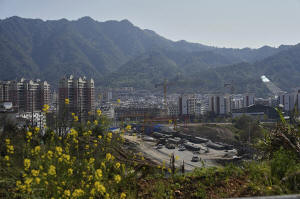Critical minerals give China an edge in trade negotiations
[June 12, 2025] By
SIMINA MISTREANU
GANZHOU, China (AP) — China’s dominance over critical minerals in global
supply chains was a powerful bargaining chip in trade talks between
Beijing and Washington that concluded with both sides saying they have a
framework to pursue a deal.
China has spent decades building the world's main industrial chain for
mining and processing such materials, which are used in many industries
such as electronics, advanced manufacturing, defense and health care.
Mines and factories in and around Ganzhou, a key production hub for rare
earths, underpin China's control over the minerals. Many residents grew
up collecting rocks containing the valuable minerals from the forested
hills surrounding the southern city and today make a living from mining,
trading or processing them.
Critical minerals as a trade issue
Responding to ever higher tariffs and other controls on advanced
technology, China told exporters of certain key rare earths and other
critical minerals to obtain licenses for every shipment abroad.
Approvals can take weeks, leading to supply chain disruptions in the
U.S. and other countries.
President Donald Trump said Wednesday that China would make it easier
for American industry to obtain much-needed needed magnets and rare
earth minerals, clearing the way for talks to continue between the
world’s two biggest economies. In return, Trump said, the U.S. will stop
efforts to revoke the visas of Chinese nationals on U.S. college
campuses.
But details remain scarce. Beijing has not confirmed what the
negotiators agreed to, and Chinese President Xi Jinping and Trump
himself have yet to sign off on it.

The Chinese Commerce Ministry said Saturday it had approved a “certain
number” of export licenses for rare earth products, apparently
acknowledging Trump’s personal request to Xi during a phone call last
week. And on Wednesday, the Ganzhou-based rare-earth conglomerate JL MAG
Rare-Earth Co. confirmed it had obtained some export licenses for
shipments to destinations including the U.S., Europe and Southeast Asia.
Experts say, however, Beijing is unlikely to do away with the permit
system enabling it to control access to those valuable resources.
“I think what the Chinese have proven is they have now created an entire
export control regime for rare earths,” said Daniel Kritenbrink, a
partner at The Asia Group consultancy. “They can turn that spigot on and
off at will.”
The only scenario in which China might deregulate its critical minerals
export is if the U.S. fully removes tariffs imposed on Chinese goods as
part of the trade war, said Wang Yiwei, a professor of international
affairs at Renmin University, echoing the Chinese government’s earlier
stance.
“Without that,” he said, “it will be difficult to blame China for
continuing to strengthen its export controls.”
An industry built over decades with government support
In 1992, Deng Xiaoping, the leader who launched China's ascent as the
world's biggest manufacturing power, famously said “the Middle East has
oil, China has rare earths,” signaling a desire to leverage access to
the key minerals.
Several generations later, Beijing has made its rich reserves of rare
earths, a group of 17 minerals that are abundant in the earth’s crust
but hard, expensive and environmentally polluting to process, a key
element of China's economic security. In 2019, during a visit to a rare
earth processing plant in Ganzhou, Xi described rare earths as a “vital
strategic resource.”
China today has an essential monopoly over “heavy rare earths,” used for
making powerful, heat-resistance magnets used in industries such as
defense and electric vehicles.
The country also produces around 80% of the world’s tungsten, gallium
and antimony, and 60% of the world’s germanium -– all minerals used in
the making of semiconductors, among other advanced technologies.
The risks of dependency on Chinese suppliers first came into focus in
2010, when Beijing suspended rare earths exports to Japan due to a
territorial dispute. The ban was lifted after about two months, but as a
precaution, Japan invested in rare earths processing plants in other
countries and began stockpiling the materials.

Beijing's across-the-board requirement for export licenses for some
critical minerals has put pressure on world electronics manufacturers
and automakers.
Some auto parts makers in Europe have shut down production lines due to
delays in supply deliveries, according to the European Association of
Automotive Suppliers. In the U.S., Tesla CEO Elon Musk said a shortage
of rare earths is affecting his company’s work on humanoid robots.
[to top of second column] |

A town is built amongst the hills near Ganzhou in southern China's
Jiangxi province on March 19, 2025. (AP Photo/Ng Han Guan)

China's critical minerals resources are dwindling
In the drab industrial hub of Ganzhou, cradled by the scenic Dayu
Mountains, the U.S.-China trade war is still a distant stressor. Miners
and small mineral traders interviewed by The Associated Press said they
are more concerned about depleting the mountains' once-abundant
resources.
Zhong, a tungsten factory manager in Ganzhou who would only give his
last name, worked his way up to manager from a miner, but he's unsure
there is a future for him and others in the industry.
“I find growing difficulties to source tungsten these days,” he said,
adding that smaller mines and trading companies are slowly disappearing
as the resources are dwindling. Tungsten is an ultra-hard metal used in
armor-piercing ammunition, nuclear reactors and semiconductors.
At least five tungsten mines have closed in the area in recent years,
according to state media. Remaining reserves are deeper and harder to
extract and process after decades of exploitation, said Li Shangkui,
chairman of the Ganzhou-based Jiangxi Yuean Advanced Materials Co., Ltd.
Processing factories in Ganzhou now routinely source materials from
other provinces or other countries. Zhong’s plant imports some raw
materials from places like Africa and Cambodia.
Major state-owned and private companies in Ganzhou are also ramping up
investments abroad. Tungsten producer Ganzhou Haisheng, for instance,
announced last year a $25 million investment in a new tungsten plant in
Thailand.
Whatever the challenges in procuring raw materials, China likely will
seek to maintain its dominance in critical minerals, said Fabian
Villalobos, an engineer and critical minerals expert at the RAND think
tank.
The U.S. lags far behind China on critical minerals
Between 2020 and 2023, the U.S. imported at least 70% of the rare earth
compounds it used from China, according to the U.S. Geological Survey.
It has diversified its sources in recent years, but still mainly relies
on China.
Since beginning his second term in office, Trump has made improving
access to critical minerals a matter of national security. But the U.S.
has an incredibly long way to go to catch up with China, experts say.

The sole operational U.S. rare earths mine, in Mountain Pass,
California, is unable to separate heavy rare earths. It sends its ore to
China for processing. The U.S. Defense Department has provided funding
to the mine's owner, MP Materials, to build new separation facilities.
It will take months to build and still only produce a fraction of what
is needed.
Friction over the issue has opened the way for government-backed
financing that was unavailable before, said Mark Smith, who ran the
Mountain Pass mine in the early 2010s and now leads NioCorp. It's
seeking about $780 million in financing through the U.S. Export-Import
Bank to build a processing facility in Nebraska for critical minerals
including rare earths.
The Defense Department has committed $439 million to building domestic
rare earth supply chains, but building a complete mining and processing
industrial chain like China's could take decades.
“There are going to be some real issues here unless we can figure out
how to get along with China for a period of time while we're developing
our own resources and our mainstream processing,” Smith said.
The spotlight on critical minerals also provides opportunities for
smaller miners to invest in extracting and processing some critical
minerals, such as tungsten, considered “niche” because they are needed
in relatively small amounts in key industries, said Milo McBride, an
expert on sustainability and geopolitics at the Carnegie Endowment for
International Peace.
“For many of these companies, the business strategy hedges on a scenario
where the U.S. and China become more confrontational and where trade
relations become more uncomfortable,” McBride said. “And all of a
sudden, what was once an uneconomic project somewhere outside of China
starts to make more sense.”
___
Associated Press news researcher Shihuan Chen contributed to this story.
All contents © copyright 2025 Associated Press. All rights reserved |